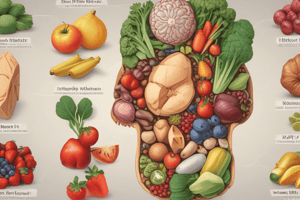Podcast
Questions and Answers
What is the caloric value of fat per gram?
What is the caloric value of fat per gram?
- 12 calories
- 9 calories (correct)
- 5 calories
- 2 calories
Which macronutrient has the same caloric value as alcohol per gram?
Which macronutrient has the same caloric value as alcohol per gram?
- Protein
- Fat
- Carbohydrates (correct)
- None of the above
Which body function does Resting Energy Expenditure primarily help maintain?
Which body function does Resting Energy Expenditure primarily help maintain?
- Breathing
- Basic body functions (correct)
- Digestion
- Muscle movement
What is the primary purpose of Basal Metabolic Rate (BMR)?
What is the primary purpose of Basal Metabolic Rate (BMR)?
What is the purpose of nutritional assessment involving clinical evaluation?
What is the purpose of nutritional assessment involving clinical evaluation?
Which nutrient category includes carbohydrates, fats, proteins, and water?
Which nutrient category includes carbohydrates, fats, proteins, and water?
What is the main function of proteins in the body?
What is the main function of proteins in the body?
Which vitamins are classified as fat-soluble?
Which vitamins are classified as fat-soluble?
What is the primary function of carbohydrates in the body?
What is the primary function of carbohydrates in the body?
What is the main role of minerals like calcium, iron, and zinc in the body?
What is the main role of minerals like calcium, iron, and zinc in the body?
Flashcards are hidden until you start studying
Study Notes
- The class begins with a prayer, emphasizing the importance of learning beyond the classroom setting.
- The lecture is on nutrition, focusing on essential nutrients, digestion, absorption, and metabolism of carbohydrates, proteins, and lipids.
- Learning outcomes for the topic of nutrition include defining nutrition, identifying essential nutrients, and evaluating diets using a food guide pyramid.
- Macronutrients include carbohydrates, fats, proteins, and water, while micronutrients include vitamins and minerals.
- Carbohydrates are divided into simple (sugars) and complex (starches and fibers), essential for energy.
- Proteins are essential for tissue growth and maintenance, categorized into essential and non-essential amino acids.
- Lipids include fats and oils, with fatty acids and cholesterol being the basic components.
- Vitamins are categorized as water-soluble (vitamin C, B complex) and fat-soluble (vitamin A, D, E, K), crucial for disease prevention and immune system health.
- Minerals like calcium, iron, and zinc play vital roles in bone strength, red blood cell production, and immune system function.
- Carbohydrates are important for brain and central nervous system function, despite the trend towards low-carb diets.
- Key takeaway: Proper intake of essential nutrients is crucial for overall health and well-being.- Energy balance involves two processes: energy intake and energy output.
- Caloric value is the amount of energy nutrients or food provide to the body, measured in calories.
- Different macronutrients have different caloric values: carbohydrates and protein have 4 calories per gram, fat has 9 calories per gram, and alcohol has 7 calories per gram.
- Basal metabolic rate is the rate at which the body metabolizes food to maintain energy requirements at rest.
- Resting energy expenditure is the energy required to maintain basic body functions.
- Ideal body weight is recommended for optimal health; Body Mass Index (BMI) is used to indicate healthy weight for height.
- Factors affecting nutrition include development, sex, ethnicity, beliefs about food, lifestyle, economics, medications, health, alcohol, advertising, and psychology.
- Nutritional variations throughout the life cycle include feeding practices for infants, toddlers, preschoolers, school-agers, young adults, middle-aged adults, and older adults.
- Dietary guidelines for Americans emphasize plant-based foods, reduced sugars and fats, regular exercise, and adequate intake of essential nutrients.
- Filipino nutritional guidelines focus on diverse food consumption, breastfeeding, calcium intake, and prevention of lifestyle-related diseases.
- Vegetarian diets can be either vegan (plant-based only) or lacto-ovo (includes dairy and eggs), requiring attention to complete protein sources.
- Altered nutrition includes malnutrition (lack of nutrients) and overnutrition (excess caloric intake); risk factors include diet history, medical history, and medication history.
- Nutritional assessment involves anthropometric measurements, biochemical parameters, clinical evaluation, and dietary history to evaluate nutritional status, diagnose malnutrition, and develop a care plan.- Different types of dietary data collection methods include 24-hour food recall, food frequency record, food diary, and diet history.
- Possible nursing diagnoses for nutrition include imbalanced nutrition, obesity, readiness for enhanced nutrition, activity intolerance, constipation, chronic low self-esteem, risk for infection, and knowledge deficits.
- Nursing interventions for nutrition involve maintaining or restoring optimal nutritional status, promoting healthy practices, preventing complications from malnutrition, aiding with eating and meal preparation, assessing self-care abilities, and providing education on nutrition therapy.
- Caregivers should have basic knowledge of feeding clients, understanding preferences, and ensuring safety.
- The text discusses the concept of "you are what you eat," emphasizing the importance of taking care of one's body through healthy eating habits and the impact of food on overall health and well-being.
Studying That Suits You
Use AI to generate personalized quizzes and flashcards to suit your learning preferences.




